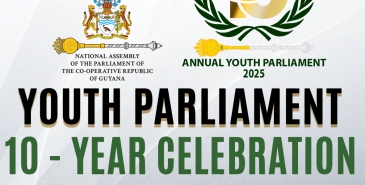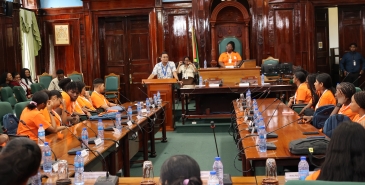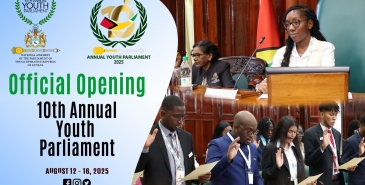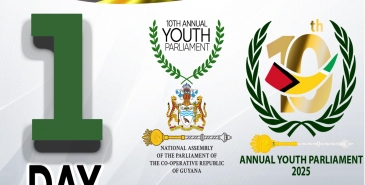Budget Debate 2013
Speech delivered at: 42nd Sitting- Tenth Parliament - 03 April, 2013
03 April, 2013
6004
Mr. Allicock: Thank you very much, Mr. Speaker. Hon. Speaker, Members of the Government Benches, Colleagues of the majority, I rise today to make my presentation to this very, very inadequate budget, Budget 2013, under the theme, Overcoming Challenges Together, Accelerating Gains for Guyana, which was presented by the Hon. Minister of Finance, Minister Ashni Singh.
This Budget is a miserable failure of the Government to understand the realities of the masses and to give expression to their needs and aspirations. It is a miserable failure of the Government to address the issues that abound in this beautiful piece of God’s earth called Guyana.
Mr. Speaker, I wish to address, specifically, the Rupununi region where I hail from. The Garden of Eden surely must have been located in this magnificent region, but the lack of vision, will, skill, the lack of prudent management, and the abundance of corrupt practices have combined to render the Rupununi one of the most backward places in the entire Caribbean.
Mr. Speaker, no proper consultation with residents or their representatives is carried out in the so-called development plans. There is no comprehensive plan.
The people of the Rupununi are very intelligent and know what is needed in their various communities. They do not need someone sitting in their carpeted, air-conditioned haven in Georgetown deciding what they need. So, it is time to start a constructive consultation process, which will take more than two hours, as is the norm by the Government.
Mr. Speaker, I know the Hon. Minister Ganga Persaud of the Ministry of Local Government and Regional Development will say that the Regional Democratic Council (RDC) is so charged, but that is only in theory. That is only a formality. The reality of the situation is that the RDC makes suggestions, but the bureaucrats do their own thing with the submissions. They speak democracy and act hypocritically. Be it as it may, Mr. Speaker, the Budget has failed, dismally, to address the needs of Region 9. Let us examine the facts.
Education
According to the figures from the education department, an average of 135 students leaves the three secondary schools at Annai, St. Ignatius and Aishalton, annually. With the advent of the secondary school at Sand Creek, this average will indeed be revised upwards. The combined percentage pass at the Caribbean Examination Certificate Examination (CSEC) is well below 50 per cent.
Mr. Speaker, what happens to the students who do not pass? In fact, Mr. Speaker, let us examine the prospects of those who pass. A miniscule percentage, through the good fortune of their families, would gain access to higher learning by gaining entry either into the Guyana School of Agriculture, the Cyril Potter College of Education (CPCE) or the University of Guyana (UG). Through scholarships, another insignificant number gains entry to the Government Technical Institute (GTI) and other institutions of learning.
The majority of persons are forced to seek employment in Lethem and Brazil. What sort of jobs is available in Lethem? Mr. Speaker, the only prospect is shop attendant. Young people with five and more subjects are working as shop attendants since there is hardly any other opportunity for them. Those who migrate to Brazil find themselves in somebody’s kitchen or on a farm as farm hands. This is no way in overcoming poverty. It is totally not satisfactory.
Let us examine the fortunes of the students who do not do well. They have no future. There is no second chance for these young people, and every one of us deserves a second chance. The education system is not geared for giving second chances. There is no three-strike rule here. One either hits it the first time or is out.
Mr. Speaker, I am quite certain that many persons in this august Chamber had the benefit, at some point in their lives, of higher learning. My people in the Rupununi have no such recourse unless they travel to Georgetown. This is the 21st century and no child, I mean not one single child, should be deprived of the right to a quality education, but that is exactly what is happening in the Rupununi.
Mr. Speaker, I do not have to remind you of the deplorable state of the education system nationwide. From the lack of trained teachers, overcrowded schools and dormitories, poor incentives for teachers and availability of appropriate text books, et cetera. The list goes on.
Those students are at great risk in this age of globalisation and fast paced information system. They are very vulnerable in this the 21st century. It need not be so. If the architects could only recognise that universal education needs not only be lip service, but vigorous and aggressive implementation, they will begin to see the light.
What is needed in Lethem is a technical institute; this will give our youths the life skills that can be used in the rapid development we are witnessing in Lethem. Instead of bussing in workers of every category into the Rupununi, we can have a ready supply of skills needed for the type of develop we need. With this approach, we will have a better opportunity for money circulation to the many households to assist us out of poverty. So, I strongly propose that we begin construction of this institute like yesterday. Our youths demand this and we have to listen to them. We have to cater to their every need.
An examination of the regional official’s submission revealed that the Hon. Minister of Finance did not agree with the region. The regional officials are on the ground and they know the priorities, but persons sit in Georgetown and pretend to know better. They think they are the bosses of instead of the servants to the people. This should not be the case. For example, for buildings - education, the regional officers requested the construction of teachers’ quarters in Toushida, Achiwuib, Kaikumbai, Haiowa, Annai, St. Ignatius and Crashwater. I find it mind boggling that the first request was not approved. These projects are listed in order of priority. So, the foremost priority – Toushida – was left out, but another village was included that was not requested for. That village is Sand Creek, a well known People’s Progressive Party/Civic (PPP/C) stronghold. What is [inaudible] is the fact that these submissions are done for up to 2016, and Sand Creek is not requested for in any of those years.
Again, requests were made to construct sanitary blocks at Arapaima and Aranaputa Nursery Schools, and Yurongperu and Kaikumbai Primary schools. These were approved, but two more were thrown in and those were Shiriri and Kumaru. The same applies here; no request was made for up to 2016, but these were included nevertheless.
We have a very critical situation at the St. Ignatius Primary School where the facility is grossly overcrowded. The learning environment is not conducive. There have been repeated requests by the school’s administration and the Parent Teachers’ Association to have the school extended. That is a priority but it did not find favour with the Hon. Minister.
Again, Mr. Speaker, there is a serious problem of overcrowding in the dormitories at St. Ignatius and Annai. We have cases of students being made to double up and being forced to share a bed. This is not healthy and needs urgent attention.
On study nights, all the students cannot share the hall together, so there is a staggered system of studying where the lower classes study earlier and the higher classes study later in the evening. Again, this request for extension of the dormitory was made by the schools’ administration and the relevant authorities and, yet, this was denied. We would like to know why these priority projects did not find favour with the Hon. Minister.
In addition, one year ago I made mention of the lack of payments to staff at the dorms at Annai Secondary and to the suppliers who would normally supply food to the dorms. I brought this to the attention of the Hon. Minister, Mr. Ganga Persaud, who promised that these matters would be taken care of. To date, these matters are still pending. People have already worked and to get that meagre bit of money is a difficulty. I would like to ask that these matters be addressed and the workers are treated as human beings.
Health
Mr. Speaker, the money allocated for health in the budget is an apology. Is that all the people in the Region are worth? We have a so-called state- of- the- art hospital at Lethem that is woefully inadequate to serve the needs of the Region. This facility is a glorified Health Centre at the best.
Region 9 has an important road link with coastal Guyana that spans some 350 miles. Tragedy happens along this trail ever so often. The most recent was Wednesday, 27th March, when a Sports Utility Vehicle (SUV) careened off the Pirara Bridge, plunging some 20 feet below. It was quite a miracle that the occupants escaped serious injury. A few years back, a presidential guard met his death at the very Bridge when the vehicle he was in ran off the Bridge. There is always the potential for serious accidents with multiple casualties. We have to become prepared for any eventuality.
In its present state, the Lethem Hospital cannot meet the demand. People will simply die, and unnecessarily too. The Budget did not consider that. We need a hospital that will serve all classes of injuries and sicknesses. Presently, the Hospital is not capable of diagnosing a simple case of typhoid, and there is always the potential for that sickness to raise its ugly head. We need a hospital that is fully staffed, adequately stocked with equipment and drugs; we need specialist doctors; we need a general surgeon, at least, not periodically but full time.
We have cases in the Rupununi where pregnant mothers were required to travel to Lethem Hospital on motorcycles over rough terrain. This is certainly not a best practice scenario. The last case we had was a young mother, Ms. Rosaline Stephens. She took in with labour pains at Parishara. There being no health worker there, the residents contacted the health worker at Haiowa some 11 miles away. The health worker got there on a motorcycle at 8.30 a.m., made a call to Lethem and was told to take the lady to Haiowa on the cycle where a vehicle will be sent to transport her to Lethem. She arrived at Lethem at 2.00 p.m. and waited for some six hours; she delivered by 3.00 p.m. but bled profusely. She was rushed to Boa Vista in Brazil at midnight. By 4.00 a.m., she was no more.
It should be noted that time and time again we have had deaths in Brazil, causing great difficulties to return the bodies to Guyana. It is very costly and stressful to the relatives. If there is a state-of-the-art hospital there, these cases should be looked after right here in Guyana. This is a continuous worry to our people.
What action has been taken to avoid a recurrence? The answer is nothing. In fact, the Budget for Region No.9 is giving scope for this to continue. Under Health Services, Land Transportation, an All Terrain Vehicle (ATV) has been requested. What is more it has been ranked a number one priority and has been classified as critical. Well, it seems that we are heading for a more critical health delivery program in Region No.9. With the potential for serious and multiple casualties, coupled with difficult terrain and the likelihood of various emergencies in far flung communities, one would have expected as a minimum the request for a 4x4 type ambulance that would be of more benefit to the people of the Rupununi.
We have another Hospital at Aishalton in South Rupununi, approximately 126 miles away from Lethem which is another glorified health centre. There is at present no doctor or Medic at this facility. The Government is harping about the billions that they are spending in health-care, but who are the beneficiaries? It is certainly not the people of South Rupununi. It must be noted that the facility once boasted a doctor, a medic and a sister. The Sister retired, the Doctor and Medic were removed for whatever reason. We now have a Community Health Worker who manages the facility at present.
Not too long ago, Mr. Nigel Hughes had reason to use the facility when he suffered a heart attack while on a visit to the area. Fortunately, he survived. Here I am talking about the communication system in the event of emergencies. Word got out that Mr. Hughes had fallen ill and efforts to contact the Aishalton district, both the hospital and the police proved futile because the radios simply were not on. What is the use of having improved facilities if they cannot be used in cases of emergencies? I wish to submit that the Hon. Ministers of Health and Local Government implement systems so that there is 24-hour communication in all communities. We cannot afford to have our people suffer undue hardships we need to have one doctor based at the Aishalton Hospital. That is the minimum we will accept and the least that the people are expecting.
At Annai, the Health Cottage is in shambles. There are regular motorcycle accidents where head injuries are most common. The doctor has access to an SUV to take patients 76 miles to Lethem. What about an ambulance? An SUV is not a suitable vehicle for patients requiring ambulatory care. What is more, many times when the vehicle is needed the District Development Officer (DDO) cannot be found, or when the DDO is found, the driver has to be located. On numerous occasions there were no fuels to undertake emergency trips to Lethem. In these instances the health officials have to rely on the good will of the residents. This is not satisfactory and the Budget does not address these issues.
On examining the regional submission, one would find that it lacks vision and common sense in relation to land transport. But like the Minister did under education, he could have put a 4-wheel drive ambulance for Aishalton, Annai and Karasabai. This Government loves to boast about improved healthcare but that is not demonstrated in this Budget. The regional authorities requested a number of items for the hospital and very few got approval. The implication here is that the facility will have to operate for another year without these devices which, I am sure, are critical to the delivery of quality healthcare. While officials would want to report the true situation of the hospital they are scared of victimisation.
THE AMERINDIAN AFFAIRS AND LAND RIGHTS
The Rupununi is mainly an Amerindian region with 65 communities spread across this vast region of some 33,000 square miles. We have communities as far north as Surama, and far south as Masakenari, the home of the Wai-Wais. Nations are being challenged today as other peoples are seeking tracts of land for various purposes. We need to safeguard the rights of the Amerindian traditional lands in this expansionist era. We need to always be sensitive to the cries of the Indigenous peoples as it relates to land demarcation and extension. It is imperative that we do so, failing which Guyana will lose the honor of having and preserving indigenous custom and habits.
The Ministry of Amerindian Affairs was established to represent the Amerindians––the Amerindian interests totally - not to suppress them. Today, some 40 years after the passing of the Hon. Stephen Campbell, who fought for the rights of the indigenous peoples, these issues are still not being settled. We need to be respected. It is time that we were seen as part of this country. We are treated as though we are things in a corner. Why cannot our lands be settled? Why is it? In the Amerindian Act 2006 it looks as though you offered us a cup of coffee with milk and sugar but told us that we can only use the coffee and you will keep the sugar and the milk. It is a terrible situation.
This Government is failing in this regard in Region No.9. Unless every community is satisfied with the land allotted to them then we have failed. We have various instances of dissatisfaction with boundaries in the Rupununi, and, as a matter of fact, in the whole of Guyana.
The most notable among these are the communities of Sawariwau in the South Central Rupununi and Parishara in the North Central Rupununi. There is a need for the authorities to sit and talk––not to talk to these communities but to sit and talk with them. There is a need to find swift amicable solutions to these problems. We cannot have these issues fester for long periods as is the case presently. Mr. Speaker, allow me to signal our support to our brothers and sisters in the other parts of the country especially those in Region No.7, particularly the villages of Kako and Isseneru. We are in solidarity with them.
The Minister of Natural Resources and the Environment, Hon. Minister Robert Persaud, said that there are a lot of plans to support the indigenous peoples, but we can only operate if we are sure that the land we are developing is ours, not only that six inches, so we have to address that.
We also have the situation with lights in Lethem, the roads, the Neighbourhood Democratic Councils (NDCs) and so many other issues. While the Government is gloating over the Budget as the largest ever, the conceptualising of it lacks vision and foresight. The Budget is seriously lacking in the human elements. It did not give expression to the people’s will. It is not a human Budget, rather, the Government continues its trend of including projects in the Budget to ensure that its cronies benefit financially. There is absolutely no correlation between value for money and these projects. The people of Region No.9, like the rest of this beautiful land of ours, are the poorer as a result of this monstrosity of a Budget. The education of our people was not addressed; our citizens will continue to die in Brazil, because the health component of the Regional Budget did not consider their needs; our roads will continue to be unsafe thus putting the lives of our people at risk; our citizens will continue to be unsafe, even in their own homes, because this uncaring administration cares nothing for their security; our Amerindian communities will not get their lands demarcated or extended in a timely manner because this Government lacks the political will to conclude the process; the water provided to our citizens will be unfit for human consumption because this Government does not care; our people will continue to experience prolonged blackouts because this Government lacks the vision to eradicate blackouts, a promise they had made since 1992. People will continue to live in poverty because the Poverty Reduction Strategy Paper is just another document for window-dressing, and the Government is woefully incompetent to implement this ambitious blueprint.
Therefore, I am calling on my colleagues to vote against this apology that we have for a Budget. I am calling on my colleagues to send a clear signal to this uncaring administration that we are not prepared to tolerate and give our blessing to mediocrity, which in turn fuels corruption and graft. I call on the Government to come out of their dream and face reality. For while the elephants fight, the grasses suffer according to the old saying. So Mr. Speaker, I cannot and will not support this document.
Thank you very much. [Applause]
Speech delivered by:
What's New

17 August, 2025
10th Annual Youth Parliament Closes: Celebrating a Decade of Impact, Excellence, and Youth Empowerment10th Annual Youth Parliament Closes: Celebrating a Decade of Impact, Excellence, and Youth Empower

13 August, 2025
Youth Parliamentarians Assemble for Grand Rehearsals for the 10th Annual Youth Parliament

12 August, 2025
10th Annual Youth Parliament Kicks Off – Young Voices, Bold Ideas, Bright Futures!

11 August, 2025
10th Annual Parliament Kicks off tomorrow

